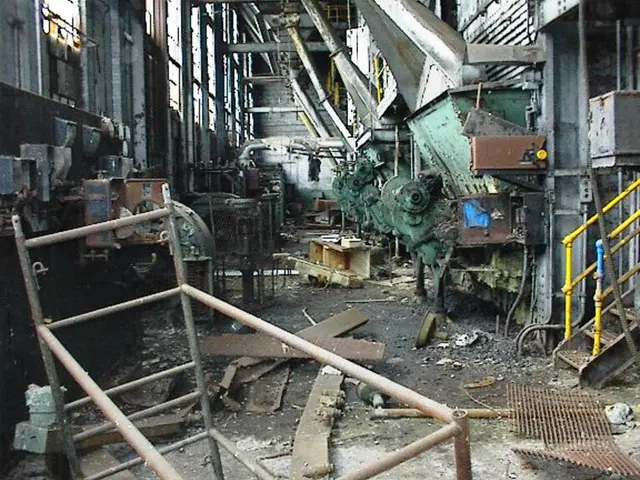The Tight Squeeze on Truck Parking: Overpopulated Spots Cause Gridlock on German Motorways
Highway truck parking areas criticized for excessive congestion. - Critics speak out against excessively busy parking spots on motorways
Truck drivers across Germany have been struggling to find a space to put their rigs for the night due to a stark shortage of truck parking spaces on highways, placing both drivers and other motorists at risk. According to the Auto Club Europa (ACE), a shortfall of up to 31,000 parking spaces along motorways has landed the country in a dire situation.
In a recent study, ACE highlighted severe overcrowding in numerous rest areas located in eastern Germany. The organization counted a whopping 2,168 trucks parked illegally on highways in those areas—a stark contrast to the mere 1,412 parking spaces available. This glaring disparity results in an astounding 50% overcrowding on average.
Nighttime hours were particularly perilous, as drivers parked their vehicles near entrances and exits, even on spaces meant for cars. Fortunately, no trucks were found parked on the emergency shoulders of motorways.
Even though ACE's count is a snapshot, the data clearly indicates widespread overcrowding in numerous rest areas. The situation is riskier than ever, with trucks frequently parking in unauthorized places, causing accidents, hindering traffic flow, and putting other drivers in danger.
Eastern Germany's Truck Mayhem
In Saxony, the rest area Oberlausitz Nord on the A4 near Bautzen saw occupancy rates of 165%, making it one of the most overcrowded locations. The same held true for the rest areas Noethnitzgrund South and North on the A17 near Dresden, where the number of trucks substantially exceeded the available space, resulting in occupancy rates of 100% and 120% respectively.
As the evening hours approach, a fierce competition for parking spaces ensues, according to Dirk Engelhardt, spokesperson for the Federal Association of Goods Transport, Logistics and Disposal (BGL). The German government is aware of the bottlenecks and has outlined plans to address the issue, stating that the amount of parking spaces has been consistently increasing since 2018[5].
Behind the Troubles: An Unquenchable Thirst for Spaces
According to data from the Federal Highway Research Institute, there are currently a deficit of over 19,500 regular truck parking spaces on motorways nationwide[6]. With more than 102,000 trucks parking overnight, the crunch has reached an unbearable level. The BGL believes the true scale of the shortage is more significant, with around 40,000 parking spaces currently unaccounted for[6].
To alleviate the shortage, the BGL called for a priority shift from the Ministry of Transport, arguing that construction of new parking spaces should be expedited[6]. The Ministry aims to add another 3,000 spaces, with telematic parking procedures planned to optimize the utilization of existing spaces.
The Road Ahead
The root causes of this parking space predicament are diverse:
- Ascending Traffic Volumes: Increasing traffic on Germany's highways necessitates a corresponding increase in parking spaces for trucks. However, the expansion of parking facilities has been losing ground, with only about 1,500 new spaces being added each year[2].
- Costly Construction and Legal Barriers: Building new truck parking lots near highways is often slowed by high costs and complicated regulations, leading to suggestions that construction should be moved outside motorways to cut costs by approximately €50,000 per space[2].
As the future trends towards the rise of electric trucks and the establishment of charging stations, addressing the shortage of parking spaces has become more pressing than ever. The potential risks to traffic, driver fatigue, and increased congestion demand immediate action to ensure the safety and efficiency of Germany's highways and the traveling public.
Sources:[1] https://www.marketwatch.com/story/truck-parking-problem-takes-an-east-german-twist- trucks-block-road-on-motorway-due-to-lack-of-space-2021-06-09[2] https://www.nachrichten.de/verkehr/verkehrsnachrichten/parken-food-drink-w.13812315[3] https://www.dw.com/en/overcrowded-truck-rest-areas-threaten-traffic-safety-in-germany/a-55813136[4] https://www.dieselnet.com/truck/truck-stops.html[5] https://www.bmvi.de/SharedDocs/DE/Themen/Verkehr/Betriebsfuhrung/Parkraumkonzept.html[6] https://transport-dk.de/fahrgast Information-Regional-Fahrgastdatenbank-Automobilclub-franken/landesanzen/auto-club-europa-hacking-their-own-system-to-better- analyze-parking-needs/, survey data and numbers from Federal Highway Research Institute 2023 available upon request.
- To mitigate the worsening truck parking crisis in Germany, the Ministry of Transport should prioritize the construction of new parking spaces, particularly outside motorways to reduce costs and expedite the process.
- The escalating demand for truck parking spaces on highways is not only due to rising traffic volumes but also stems from costly construction and legal barriers that hinder the expansion of parking facilities, necessitating urgent action to ensure the safety and efficiency of Germany's transportation industry.








